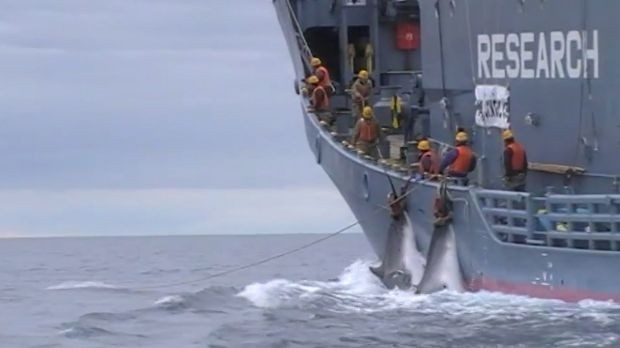Iceland resumes whale hunting despite objections from animal rights groups
Iceland is the only country that allows the killing of longer fin whales.

Iceland has resumed the practice of whale hunting after being forced to put a temporary ban in place until the end of August. The development comes amid objections by conservationists and animal rights activists.
The Icelandic government said on Thursday that whaling has been resumed with stricter requirements on hunting methods and increased supervision. The move has attracted international condemnation from animal rights groups, who have called it "shameful."
The new rules brought in by the government allow whaling within a distance of 25m (80ft) from the boat in daylight. The people involved in the activity need to use the correct equipment and should be properly trained.
"The aforesaid Regulation stipulates that the Food and Veterinary Authority and the Directorate of Fisheries shall work together to supervise whale hunting. The plan is for these bodies to submit a report to the Ministry at the end of the whaling season, summarising the main findings of the supervision of whale hunting in 2023," read a statement from the government.
Iceland is the only country that allows the killing of longer fin whales. According to the data provided by Iceland's Ministry of Industries and Innovation, the country accounts for roughly 3% of all whales hunted globally. It is said that whaling is part of its culture and traditions.
Devastating news just in from Iceland - the Icelandic government will allow whalers to hunt fin whales again after suspending the hunt this summer.
— Whale and Dolphin Conservation (WDC) (@whalesorg) August 31, 2023
Suggesting that better training for hunters, education and better equipment or killing methods could ever make whaling acceptable… pic.twitter.com/WJwT9j0cfw
The country earns a significant portion of its total GDP from whale hunting. The practice has registered a decline in the last few years, and people's opinions about whaling have not been too favourable either.
A survey conducted in Iceland revealed that 51 per cent of people have turned against it over the years. The suspension of whale hunting that came into force in June this year was welcomed by the tourism sector and locals.
The government's move to suspend whaling until August was seen as a step to rethink the future of whaling in the country.
The big picture:
Iceland, Norway, and Japan are the three countries that allow the practice of whale hunting for profit. Despite the International Whaling Commission (IWC) banning commercial whaling in 1986, whales continue to be killed in their hundreds.
The commission sets limits for commercial whaling, with Norway and Iceland as exceptions. The ban, also called the commercial whaling moratorium, is binding on all other members of the IWC. But Norway and Iceland set their own whaling limits.
A study conducted by the Icelandic government revealed that more than 40% of whales killed during its most recent whaling season suffered slow and painful deaths. It also needs to be noted that more than 1,900 fin and minke whales have been killed in Iceland since 1986.
According to the World Wildlife Fund, fin whales in the North Atlantic are listed as endangered species. They are the second-largest mammals on earth.
Commercial whaling practices have also put the minke whale population in danger. Minke whales are relatively small in size and are used for food and scientific research in Greenland, Japan, and Norway.
Japan is currently the biggest market for whale meat. It resumed commercial whaling activities in 2019 after leaving the IWC.
© Copyright IBTimes 2025. All rights reserved.






















